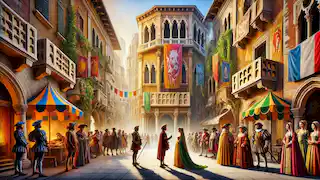In the city of Verona, where ancient grudges breed new conflicts, two noble families, the Montagues and the Capulets, are embroiled in a bitter feud. Amidst this enmity, a tale of love and tragedy unfolds, as two young souls defy their families' hatred to pursue their own happiness. This is the story of Romeo Montague and Juliet Capulet, whose love, though forbidden, burned with a passion so intense that it would forever alter the fate of their families.
The story begins in the lively streets of Verona, where two servants from the house of Capulet, Sampson and Gregory, jest about the feud between their house and the Montagues. Their playful banter soon turns into a quarrel when they encounter servants from the Montague household. A brawl erupts, drawing in members of both families, including Tybalt, Juliet’s fiery cousin. The skirmish is broken up by Prince Escalus, who declares that further violence between the two houses will be punished by death. Romeo Montague, who has been absent from the fight, is introduced as a lovesick young man pining for Rosaline, a woman who does not return his affections. His cousin, Benvolio, and friend Mercutio try to cheer him up, urging him to forget Rosaline and attend the Capulets’ grand ball that evening in disguise. The Capulet household is abuzz with preparations for the ball. Lord Capulet welcomes guests of all kinds, eager to show off his daughter Juliet, who is soon to be married to Paris, a wealthy and influential suitor. Juliet, however, feels no love for Paris and is uncertain about the prospect of marriage. Her mother, Lady Capulet, presses the issue, trying to convince her that Paris is a worthy match. Romeo, Benvolio, and Mercutio arrive at the Capulet ball disguised in masks. Romeo, who came reluctantly, is soon struck by a vision of beauty—Juliet. All thoughts of Rosaline are forgotten as Romeo watches Juliet from across the room. He approaches her, and their hands touch. In that instant, both are captivated by each other’s presence. They exchange a few words and share a kiss, unaware that they belong to rival families. Before long, Tybalt, recognizing Romeo, becomes enraged and vows to challenge him. However, Lord Capulet forbids it, unwilling to cause a scene at his own event. Romeo slips away with his friends, but his heart remains with Juliet. Juliet, equally smitten, is shocked to learn that Romeo is a Montague, the sworn enemy of her family. Torn between her love and her loyalty to her family, she retreats to her balcony to ponder her situation. That night, unable to stay away, Romeo sneaks into the Capulet orchard and overhears Juliet speaking to herself on her balcony, expressing her love for him despite the hatred between their families. Moved by her words, Romeo reveals himself, and the two confess their love for each other. They share a tender moment, agreeing to marry in secret. The next day, with the help of Friar Laurence, a kindly priest, Romeo and Juliet are married in a small, private ceremony. The Friar hopes that their union will end the feud between their families. Juliet’s nurse, who knows of the marriage, helps facilitate their meetings in secret. Meanwhile, Tybalt, still enraged by Romeo’s presence at the ball, seeks him out for a duel. Romeo, newly married to Juliet and wishing to avoid further conflict, refuses to fight Tybalt. Mercutio, unable to stand the insult, steps in and duels with Tybalt. The fight escalates, and Mercutio is mortally wounded. Enraged by the death of his friend, Romeo abandons his pacifism and kills Tybalt in a fit of revenge. Romeo, now a murderer, is forced to flee. The Prince of Verona, hearing of the bloodshed, banishes Romeo from the city. He declares that should Romeo return, he will be executed. Despair grips both lovers, as Romeo is forced to leave Juliet behind. Friar Laurence devises a plan to reunite the couple. He gives Juliet a potion that will make her appear dead for forty-two hours. During this time, she will be placed in the family tomb, and Romeo will be informed of the ruse so he can come to take her away when she wakes. Juliet, distraught at the thought of marrying Paris and being separated from Romeo, agrees to the plan. She takes the potion and falls into a death-like sleep. When her family discovers her lifeless body the next morning, they are overcome with grief and arrange for her burial in the family tomb. The plan goes awry when Friar Laurence’s message to Romeo is delayed. Instead, Romeo receives news that Juliet has died. Heartbroken and determined to join her in death, Romeo purchases poison and travels to Verona in secret. He arrives at Juliet’s tomb, where he encounters Paris, who has come to mourn his would-be bride. Believing that Romeo has come to desecrate the tomb, Paris challenges him to a fight. In the ensuing duel, Paris is killed. Romeo enters the tomb and finds Juliet’s lifeless body. Overcome with sorrow, he drinks the poison, choosing to die by her side. Just moments after he succumbs to the poison, Juliet awakens from her induced sleep. She finds Romeo dead beside her and, realizing what has happened, takes his dagger and ends her own life. Friar Laurence arrives too late to prevent the tragedy. The bodies of Romeo and Juliet are discovered by the grieving families, and it is only in the wake of their children’s deaths that the Montagues and Capulets finally reconcile. The tragic love story of Romeo and Juliet becomes a cautionary tale in Verona, reminding its citizens of the futility of hatred and the enduring power of love. Though they were separated by the enmity of their families, Romeo and Juliet’s love was stronger than the hatred that surrounded them. Their brief lives may have ended in tragedy, but their love remains immortal, a symbol of devotion that transcends even death. In the end, the Montagues and Capulets vow to never let their feud cause such devastation again. Statues are erected in honor of Romeo and Juliet, ensuring that their love story will live on for generations to come. The city of Verona, once divided by hatred, is united in grief and in the memory of two young lovers whose passion could not be contained by the limits of family or fate. The story of Romeo and Juliet is a timeless reminder of the consequences of unchecked hatred and the power of love to overcome even the most deeply rooted conflicts. Their love, though fleeting, touched the hearts of those around them and became a beacon of hope for future generations. Their tragedy stands as a testament to the fact that love, in its purest form, knows no boundaries—neither age, nor status, nor the bitterness of old grudges can keep true love apart. The tale of Romeo and Juliet will continue to be told, its lessons as relevant today as they were in the streets of Verona. The lives of these star-crossed lovers remind us all that love can be both a beautiful and dangerous force, one that should be cherished and handled with care. As their story comes to a close, we leave Verona behind, but the legacy of Romeo and Juliet lingers in our minds and hearts. Their love story is a testament to the strength of the human spirit and the capacity for love to rise above the darkest of circumstances. The final image of the lovers, reunited in death, serves as a reminder that though life is fleeting, love endures. Their journey may have been short, but its impact echoes throughout time, inspiring countless others to believe in the power of love. And so, with the final breath of this tale, we are left with a single, unshakable truth: the love of Romeo and Juliet will live forever. {{{_04}}}Act 1: The Streets of Verona
Act 2: A Fateful Encounter

Act 3: The Balcony Scene
Act 4: Tragic Consequences

Act 5: Miscommunication and Death

Epilogue: A Love That Endures
The Legacy of Romeo and Juliet
The Final Reunion


















